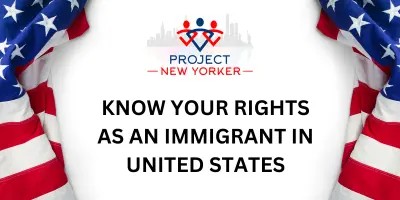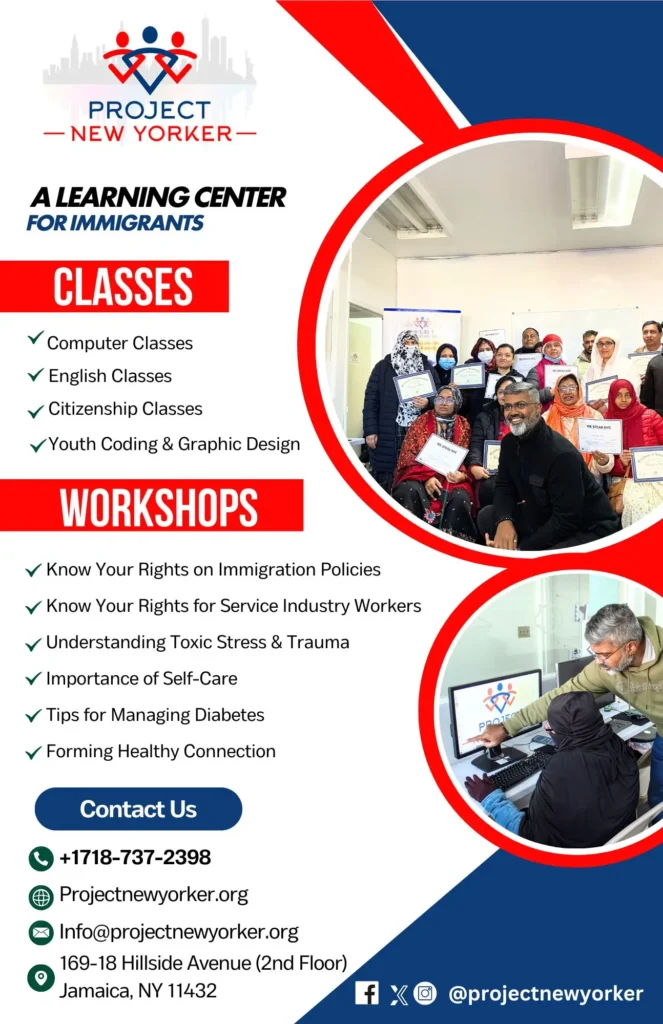Know Your Rights As an Immigrant In United States: Essential Guide

It is not easy to adapt to life in a foreign nation. Knowing your rights as an immigrant in the US is important.
Being an immigrant, it is a fundamental aspect of being equal and under protection by law to know your rights. The U. S. Has enacted policies and laws that protect the rights of immigrants whether they are documented or undocumented. These policies will affect the majority of things in your life, such as working, learning, and encountering law enforcers.
Being aware of these rights, you shall make informed decisions and be shielded from potential injustices. From this book, you will understand your rights and how to assert them and be in a position to settle into your new surroundings confidently.
Immigrant Rights Basics
It is not simple to switch countries. It is better to know your rights as an immigrant from the U.S. It is better to know your rights so that you can protect yourself and your family members. We introduce an overview of immigrant rights here.
Legal Protections
As an immigrant, you have specific legal protections. These safeguards ensure fair treatment under U.S. laws. Here are some key points:
- Right to Due Process: You have the right to a fair legal process. This includes hearings before a judge.
- Legal Representation: You can hire a lawyer. If you cannot afford one, you may ask for legal aid services.
- Protection from Discrimination: Discrimination based on race, nationality, or religion is illegal.
Immigration status does not affect your right to file complaints. If you face unfair treatment, you can take legal action. Various organizations offer help and guidance. Below is a table outlining some of these protections:
| Right | Description |
|---|---|
| Due Process | Fair legal proceedings and hearings |
| Legal Representation | Right to hire a lawyer or seek legal aid |
| Protection from Discrimination | Illegal to discriminate based on race, nationality, or religion |
Remember, knowing these legal protections empowers you. Stay informed and seek help when needed.
Constitutional Rights
Immigrants also have constitutional rights. These rights are fundamental and apply to everyone in the U.S. Here are some important ones:
- Freedom of Speech: You can express your thoughts and opinions.
- Freedom of Religion: You can practice any religion or none at all.
- Right to Privacy: Your home and personal belongings are protected from unreasonable searches.
These rights are guaranteed by the U.S. Constitution. They apply regardless of your immigration status. Below is a detailed look at these constitutional rights:
| Right | Description |
|---|---|
| Freedom of Speech | Right to express your thoughts and opinions |
| Freedom of Religion | Right to practice any religion or none |
| Right to Privacy | Protection from unreasonable searches |
Understanding these rights helps you feel secure. You can live and work without fear. Always remember your constitutional rights.
Visas And Status
You need to learn your rights when you are an immigrant in America. The most crucial thing that you need to learn is the types of visas and how you can keep your status. You can have a better experience and avoid legal troubles by knowing this. Let us discuss the types of visas and why you should keep your status.
Types Of Visas
Immigrants in the United States can apply for various types of visas, depending on their purpose for entering the country. Here are some common visa categories:
- Tourist Visas (B-1/B-2): These are for short-term visits, either for business (B-1) or leisure (B-2).
- Student Visas (F and M): F visas are for academic studies, while M visas are for vocational training.
- Work Visas (H-1B, L-1, O-1): These are for various employment opportunities, including specialty occupations and intra-company transfers.
- Family-Based Visas: These allow family members of U.S. citizens or permanent residents to join their loved ones.
- Immigrant Visas: These lead to permanent residency, such as the Diversity Visa (DV) lottery or sponsorship by a relative or employer.
Here’s a brief overview of some key visa types in table format:
| Visa Type | Purpose | Duration |
|---|---|---|
| B-1/B-2 | Tourism/Business | Up to 6 months |
| F-1 | Academic Studies | Duration of Study |
| H-1B | Specialty Occupations | Up to 6 years |
| L-1 | Intra-Company Transfer | Up to 7 years |
Choosing the correct visa type is essential. It determines what you are allowed to do and the length of your stay in the U.S. Make sure to check the specific requirements for each visa category.
Maintaining Status
Once you have your visa, it’s important to maintain your status to avoid legal problems. Here are some key points to remember:
- Stay Informed: Always know the terms and conditions of your visa. Understand the expiration date and any restrictions.
- Report Changes: Notify U.S. Citizenship and Immigration Services (USCIS) of any changes in your address, employment, or academic status.
- Follow the Rules: Stick to the activities allowed by your visa. For example, do not work if you have a tourist visa.
- Renew on Time: Apply for extensions or renewals well in advance of your visa’s expiration date.
Maintaining your status involves several steps:
- Respect the conditions of your visa.
- Keep track of important dates and deadlines.
- Seek legal advice if you are unsure about your status.
Ignoring these points can lead to serious consequences like deportation or being barred from re-entering the U.S. Staying compliant ensures your time in the U.S. remains productive and worry-free.
Dealing With Law Enforcement
It is important to understand your rights as an immigrant in the US. The most critical topic to be aware of is how to handle law enforcement. Whether you must engage with the police or are visited by an immigration raid, understanding your rights will make a big difference. This guide will empower you to handle these encounters confidently and clearly.
Interactions With Police
When interacting with the police, it’s essential to remain calm and respectful. Knowing your rights can protect you in these situations. Here are some key points to remember:
- Stay Calm: Always stay calm and do not run or resist.
- Right to Remain Silent: You have the right to remain silent. You do not have to answer questions about your immigration status or where you were born.
- Ask if You’re Free to Go: If you’re not under arrest, ask if you are free to go. If the officer says yes, calmly walk away.
- Do Not Consent to Searches: You do not have to consent to a search of yourself, your belongings, or your car. If the police say they have a warrant, ask to see it.
It’s also helpful to know what to do if you are stopped while driving:
- Pull Over Safely: If you see flashing lights, pull over safely and turn off your car.
- Keep Your Hands Visible: Keep your hands on the steering wheel. This shows you are not a threat.
- Provide Required Documents: You must show your driver’s license, registration, and proof of insurance.
- Do Not Answer Questions: If asked about your immigration status, you can say, “I choose to remain silent.”
Remember, understanding your rights is the first step to protecting yourself.
Immigration Raids
Immigration raids can be frightening, but knowing your rights helps you stay calm. If agents come to your home, follow these steps:
- Do Not Open the Door: You do not have to open the door unless the agents have a warrant signed by a judge.
- Ask for Identification: Ask the agents to show their badges and any warrant. You can read the warrant through a window or slip it under the door.
- Do Not Sign Anything: Do not sign any documents without talking to a lawyer first.
- Stay Silent: You have the right to remain silent. Do not share any information about your immigration status.
- Record the Raid: If possible, record the raid. This can provide important evidence if your rights are violated.
If you are at work during a raid, follow these guidelines:
- Stay Calm: Do not run or make sudden movements.
- Know Your Rights: You still have the right to remain silent and not answer questions about your immigration status.
- Document Everything: If you can, take notes about what happens. Write down the names and badge numbers of the agents.
- Contact a Lawyer: As soon as possible, contact an immigration lawyer for help.
Understanding and exercising your rights can make a crucial difference during these stressful situations. Stay informed and prepared.
Access To Legal Help
As an immigrant in the United States, knowing your rights is vital. One of the most important aspects of protecting those rights is having access to legal help. Understanding how to find the right legal support can make a significant difference in your journey. This section will guide you through finding an attorney and free resources available to you.
Finding An Attorney
Finding the right attorney is crucial for navigating the complex immigration system. Here are some steps to help you in your search:
- Research: Look for attorneys who specialize in immigration law. Check their credentials and experience.
- Referrals: Ask friends, family, or community organizations for recommendations.
- Consultations: Many attorneys offer free initial consultations. Use this opportunity to ask questions and understand your options.
- Reviews: Check online reviews and testimonials from previous clients.
- Bar Association: Visit your state’s bar association website. They often have directories of licensed attorneys.
Here is a table to help you with what to ask during a consultation:
| Question | Why It’s Important |
|---|---|
| What is your experience with immigration cases? | Ensures they have relevant expertise. |
| What are your fees? | Helps you understand the cost involved. |
| What is your success rate? | Gives you an idea of their effectiveness. |
| How will you communicate with me? | Ensures you stay informed about your case. |
Employment Rights
Being an immigrant in the United States, you need to know your rights, particularly your work rights. Your work rights ensure that you are not discriminated against at the workplace. Knowing these rights will provide you with a secure and equitable working condition. Whether documented or not, you do have some legal safeguards.
Workplace Protections
Immigrants have the right to be treated fairly at work. This includes:
- Minimum Wage: You must be paid at least the federal minimum wage.
- Safe Working Conditions: Your employer must provide a safe and healthy workplace.
- Overtime Pay: You should receive overtime pay for hours worked over 40 in a week.
- Freedom from Discrimination: You cannot be discriminated against based on race, color, religion, sex, national origin, age, disability, or genetic information.
- Right to Organize: You have the right to join or form a union.
These protections are implemented by multiple federal agencies, including the U.S. Department of Labor, DOL, and the Equal Employment Opportunity Commission, EEOC. In case you think your rights are being withheld, you can seek help from these agencies. In addition, don’t forget that your immigration status doesn’t matter to the right to be treated equally at the workplace.
Reporting Violations
If you believe your employment rights have been violated, you should report it. Here’s how:
- Document Everything: Keep records of any incidents, including dates, times, and details of what happened.
- Contact the Appropriate Agency: Depending on the violation, you may need to contact different agencies. For wage issues, contact the DOL. For discrimination, contact the EEOC.
- File a Complaint: Most agencies have an online complaint form. You can also call or visit a local office.
- Seek Legal Advice: Consider consulting with an attorney who specializes in employment law.
It is worth it to move fast since there are deadlines for filing complaints. There are protections against retaliation in most agencies. Your employer cannot punish you for reporting violations under this. Knowing your rights and how to report violations means you are treated well while at work.
Education Rights
As an immigrant in the United States, knowing your rights is essential for ensuring a better future. One of the most important rights is access to education. Education can open many doors and provide opportunities for personal and professional growth. Understanding your education rights can help you make informed decisions and take advantage of the resources available to you.
Access To Schools
Immigrant children have the right to attend public schools in the United States. This right is protected by federal law, regardless of the child’s or their parents’ immigration status. Schools cannot deny access to students based on their immigration status.
Here are some key points to remember:
- Public schools must provide equal access to all students.
- Schools cannot ask for a student’s or parent’s immigration status.
- Children have the right to attend school from kindergarten through 12th grade.
- Language barriers should not prevent children from receiving an education. Schools must provide language assistance programs.
Enrolling your child in school is straightforward. You will need to provide basic documents such as proof of residency and vaccination records. Remember, schools cannot ask for documents that reveal immigration status.
Here is a table summarizing the key documents needed for school enrollment:
| Document | Description |
|---|---|
| Proof of Residency | Utility bill or lease agreement |
| Vaccination Records | Immunization history |
Financial Aid Options
Financing education can be challenging. Fortunately, there are financial aid options available for immigrant students. Understanding these options can help you manage the costs of higher education.
Here are some financial aid options for immigrant students:
- Federal Aid: Undocumented students are not eligible for federal financial aid. However, students with Deferred Action for Childhood Arrivals (DACA) status may qualify for state financial aid and scholarships.
- State Aid: Some states offer financial aid to undocumented students. Check with your state’s education department for specific programs and eligibility requirements.
- Private Scholarships: Many private organizations offer scholarships specifically for immigrant students. Research and apply for these scholarships to help cover education costs.
- Institutional Aid: Some colleges and universities provide financial aid to undocumented students. Contact the financial aid office of the institutions you are interested in to inquire about available options.
It is important to research and apply for financial aid opportunities early. This can increase your chances of receiving the assistance you need.
Here is a table summarizing the key financial aid options:
| Type of Aid | Eligibility |
|---|---|
| Federal Aid | DACA students may qualify for state aid |
| State Aid | Varies by state |
| Private Scholarships | Available to immigrant students |
| Institutional Aid | Offered by some colleges and universities |
By taking advantage of these financial aid options, you can make higher education more affordable and achievable.
Health Care Access
Understanding your rights as an immigrant in America is important. Health care is one of them. You, as an immigrant, should be able to understand how to avail health services so that you may maintain your health as well as that of your family members. The following is the breakdown of two such important categories: Emergency Services and Public Health Programs.
Emergency Services
In the United States, you have the right to emergency medical services regardless of your immigration status. Emergency rooms (ERs) must provide care to anyone needing immediate medical attention. Here are key points to remember:
- Emergency rooms cannot refuse to treat you.
- You do not need insurance to get emergency care.
- Hospitals must stabilize your condition before discussing payment.
Knowing what qualifies as an emergency is also helpful. Situations like severe pain, difficulty breathing, or heavy bleeding are emergencies. If you are unsure, it is better to go to the ER. They will assess your condition and provide the necessary care.
Here is a simple table to help understand common emergency situations:
| Emergency Situation | Action |
|---|---|
| Severe Pain | Go to ER |
| Difficulty Breathing | Call 911 |
| Heavy Bleeding | Go to ER |
| Chest Pain | Call 911 |
In emergencies, you can also call 911 for immediate help. The operators can guide you and dispatch emergency services. Do not worry about your immigration status in these situations. Your health and safety come first.
Public Health Programs
Public health programs can be a lifeline for immigrants. These programs offer free or low-cost health services. Some of these programs include:
- Medicaid: Provides health coverage for low-income individuals.
- Children’s Health Insurance Program (CHIP): Offers health coverage for children.
- Community Health Centers: Provide care regardless of your ability to pay.
Eligibility for these programs can depend on various factors. These include income level, state of residence, and sometimes immigration status. For example, some states offer Medicaid to undocumented immigrants for emergencies.
Community Health Centers are widespread. They offer services like vaccinations, health check-ups, and prenatal care. You can find a local center through the Health Resources and Services Administration (HRSA) website.
Here is a quick overview of some public health programs:
| Program | Services | Eligibility |
|---|---|---|
| Medicaid | General health coverage | Low-income individuals |
| CHIP | Health care for children | Low-income families |
| Community Health Centers | Basic medical services | Everyone, regardless of status |
Understanding these programs can help you access the care you need. Do not hesitate to seek assistance from these resources. Your health is important, and these programs are here to help you maintain it.

Credit: www.nyc.gov
Community Support
As an immigrant in the United States, understanding your rights is crucial. Community support can make navigating this new chapter easier. Local organizations and advocacy groups can offer guidance, resources, and a sense of belonging. Let’s explore how these entities can assist you.
Local Organizations
Local organizations play a vital role in supporting immigrants. They offer a variety of services to help you settle and thrive in your new community. These organizations can provide legal assistance, language classes, and job placement services.
Here are some benefits of connecting with local organizations:
- Legal Assistance: Many local organizations offer free or low-cost legal services. They can help you understand your rights and navigate the complex legal system.
- Language Classes: Learning English is crucial for communication. Local organizations often offer classes to help you improve your language skills.
- Job Placement Services: Finding a job can be challenging. These organizations can assist with resume writing, job search, and interview preparation.
Below is a table of Project new yorker services as local organization:
| Organization | Services |
|---|---|
| Project New Yorker | Classes Computer Classes English Classes Citizenship Classes Youth Coding & Graphic Design Workshops: Know Your Rights on Immigration Policies Know Your Rights for Service Industry Workers Understanding Toxic Stress & Trauma Importance of Self-Care Tips for Managing Diabetes Forming Healthy Connection |

Advocacy Groups
Advocacy groups are essential in fighting for immigrant rights. They work to change laws, policies, and practices that affect immigrants. These groups aim to create a more just and inclusive society.
Here are ways advocacy groups can support you:
- Legal Representation: Advocacy groups often provide legal representation in court to protect your rights.
- Policy Change: They work to influence lawmakers to create fair immigration policies.
- Community Education: These groups host workshops to educate the community about immigrant rights and resources.
Below is a table of some advocacy groups and their missions:
| Group | Mission |
|---|---|
| Immigrant Justice Network | Legal defense, Policy advocacy, Community education |
| Equal Rights Coalition | Fighting discrimination, Promoting equal rights, Supporting immigrant integration |
Frequently Asked Questions
What Is The Know Your Rights Card For Immigrants?
The “Know Your Rights” card informs immigrants of their legal rights in encounters with law enforcement. It helps protect against unlawful actions.
What Rights Do Immigrants Have In The United States?
Immigrants in the United States have rights to free speech, religion, and protection under the law. They can work, study, and receive medical care. Legal immigrants can apply for citizenship and social benefits.
What Human Rights Do Immigrants Have?
Immigrants have fundamental human rights including protection from discrimination, access to education, healthcare, and fair working conditions. They also have the right to seek asylum and family unity.
Why Is It Important For Immigrants To Know Their Rights?
Immigrants must know their rights to protect themselves from exploitation and discrimination. Understanding these rights ensures fair treatment.
Conclusion
Know your immigrant rights. Knowledge is power and safety. Always seek fact-checking information. Build relationships with trustworthy sources of legislation. Learn about your status. Legislation is changeable. Stay informed. Defend causes that are pro-immigrants. Your rights are important.
Protect yourself and others. This is your home now. Persist and be positive.



